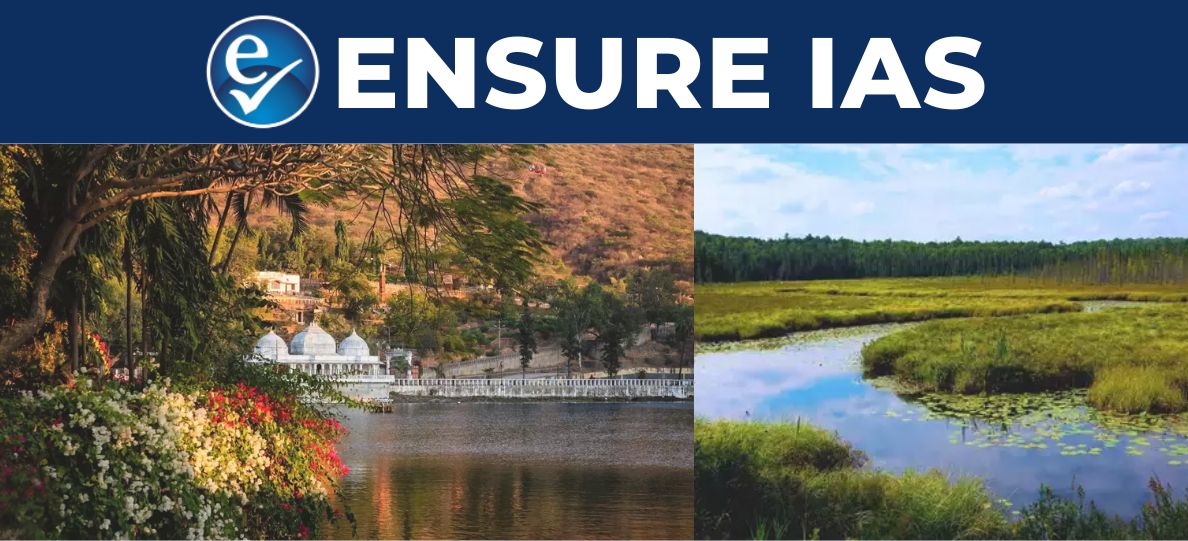- Courses
- GS Full Course 1 Year
- GS Full Course 2 Year
- GS Full Course 3 Year
- GS Full Course Till Selection
- Online Program
- GS Recorded Course
- NCERT (Recorded 500+ Hours)
- Polity Recorded Course
- Geography Recorded Course
- Economy Recorded Course
- AMAC Recorded Course
- Modern India, Post Independence & World History
- Environment Recoded Course
- Governance Recoded Course
- Science & Tech. Recoded Course
- International Relations and Internal Security Recorded Course
- Disaster Management Module Course
- Ethics Recoded Course
- Essay Recoded Course
- Current Affairs Recoded Course
- CSAT
- 5 LAYERED ARJUNA Mentorship
- Public Administration Optional
- ABOUT US
- OUR TOPPERS
- TEST SERIES
- FREE STUDY MATERIAL
- VIDEOS
- CONTACT US
1st Two Indian Cities Indore and Udaipur Earns Global Recognition for ‘Wetland Conservation’
1st Two Indian Cities Indore and Udaipur Earns Global Recognition for ‘Wetland Conservation’
28-01-2025

- Prime Minister Narendra Modi recently praised Indore and Udaipur for becoming the 1st two Indian cities to make it to the global list of 31 accredited wetland cities under Ramsar Convention on Wetlands.
- This honor shows India's ongoing commitment to sustainable urban development and the conservation of wetlands, balancing both urban growth and environmental preservation.
- Indore and Udaipur were nominated by the Ministry of Environment, Forests, and Climate Change as part of India’s efforts to promote wetland conservation in urban areas.
What is Wetland City Accreditation (WCA)?
What is wetland?
|
Importance of Wetlands in Indore and Udaipur:
-
Indore:
- Indore is known for its cleanliness and progressive urban policies.
- Sirpur Lake, a Ramsar site, is located in Indore. The lake supports a wide variety of water birds and plays a vital role in the city’s biodiversity.
- There are plans to develop Sirpur Lake into a bird sanctuary, further enhancing its role in conservation and ecotourism.
-
Udaipur:
- Udaipur is famed for its historic lakes, which also play a vital role in the region’s water management and climate resilience.
- Udaipur is home to 5 major wetlands: Pichola Lake, Fateh Sagar, Rang Sagar, Swaroop Sagar, and Doodh Talai.
- These wetlands are crucial not only for the city’s heritage but also for mitigating climate extremes, such as heat waves and droughts.
Benefits of Wetlands for Urban Areas:
- Wetlands offer critical ecological services such as:
- Flood regulation: Wetlands absorb excess rainwater and runoff, reducing the risk of flooding in urban areas.
- Water purification: Wetlands filter out pollutants and improve the quality of water.
- Biodiversity support: Wetlands provide habitats for diverse flora and fauna, supporting migratory birds and other species.
- Conservation of wetlands is essential for maintaining ecosystem balance, enhancing climate resilience, and providing a foundation for sustainable urban development.
India’s Ramsar Sites and Wetland Conservation:
About the Ramsar Convention:
|
Why is Wetland Conservation Important for India?
- Wetlands in India are crucial for water security, especially given the challenges posed by climate change and population growth.
- They help regulate water cycles, recharge groundwater, and prevent soil erosion.
- Wetland preservation can enhance climate resilience by buffering cities from extreme weather events like floods and droughts.
- Wetlands play a key role in supporting biodiversity and improving urban livability through clean air, water, and ecosystem services.
|
Also Read |
|
FREE NIOS Books |
UPSC Daily Current Affairs |
UPSC Monthly Mgazine |
Previous Year Interview Questions |
Free MCQs for UPSC Prelims |
UPSC Test Series |
ENSURE IAS NOTES |
Our Booklist |
PLFS 2025: Monthly Jobs Data, Bigger Survey
PLFS 2025: Monthly Jobs Data, Bigger Survey


